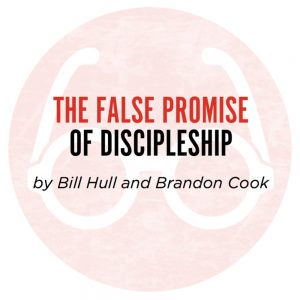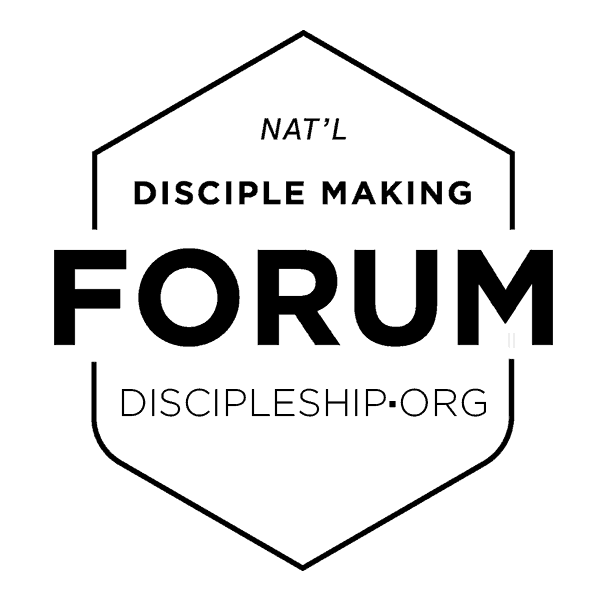
By Bill Hull and Brandon Cook: This is part of The False Promise of Discipleship blog series from The Bonhoeffer Project.
In John chapter 3, we read the conversation between Jesus and Nicodemus, a leading Jewish figure. Nicodemus comes to Jesus under the cover of night, apparently worried about who might see him talking with the enigmatic rabbi from Galilee. He comes because he’s concerned. He’s wondering what foundation he’s building his life on, and if there’s something he might be missing. After all, this teacher named Jesus speaks with an authority that Nicodemus has never heard before. Still, Nicodemus is conflicted: Jesus’ message is compelling, but he has built his life on a certain way of thinking about God and how one rightly approaches Him. Namely, through the right sort of religious life, by which he makes himself acceptable before God.
Jesus says something quite strange that goes right over Nicodemus’ head. “Nicodemus, you must be born again.”
“Sure. Wait … what?”
Jesus repeats it. “You must be born again,” implying that Nicodemus must forsake what he was born into (his physical birth) and leave that behind to be born into something new.
Nicodemus is right in the thick of that which he has been born into. Let’s call it The Human Paradigm, for it represents the paradigm of human life outside the Kingdom of God.
The Human Paradigm
The Human Paradigm is endemic to most religious systems and beyond that, to the human heart, where it gets its start. It’s based on the idea that if we do A, B, and C, we can earn X. (If you’re having a cold-sweat flashback to sophomore algebra, fear not. That’s as complicated as this equation gets). This is the “eat what you kill” paradigm that all of us are born into and grow up in, reinforced at every corner: “Be a good boy, and Santa will bring you lots of presents”; “Be a good girl, and Mommy will give you a cookie.”
In The Human Paradigm, there’s always some “X” that we want; presents, cookies, love and affection, etc. X marks the spot. It’s the treasure we’re after. We all have these X’s that we long for, and pretty much every human context has some X—the place you want to be. Advertisers are always preying on our belief that if we just have X or buy X, or take a vacation to X, we’ll be, finally, satisfied. X might also represent what you want your life to be: You have enough money, the house, the car, the boyfriend or girlfriend you’re pining for, the skinny body you hope for. It’s the place where people like you. The place where you’re confident. In short, it’s the place where you’ve arrived. And won’t life just be wonderful once you’ve arrived! The good news is that it’s all in your power. Just follow the simple steps. Whatever they may be.
Consider this equation:
Go to College + Get Married + Make A Lot of Money + Don’t Cheat or Get Caught Cheating = American Dream*
* a euphemism for happiness based on security and comfort
Or here’s another popular one:
Be the nice guy + Don’t say what you really think = People will like you*
* even if you’re miserable inside!
What are your favorite equations? What are the X’s in your life?
*Stay tuned for the next blog in this series, which will be coming soon!
This is an excerpt from the free eBook written Bill Hull and Brandon Cook of The Bonhoeffer Project. You can download the full eBook on their homepage here.
Bill Hull is a Co-Founder of The Bonhoeffer Project. Bill’s passion is to help the church return to its disciple making roots and he considers himself a discipleship evangelist. This God-given desire has manifested itself in 20 of pastoring and the authorship of many books. Two of his more important books, Jesus Christ Disciple Maker, and The Disciple Making Pastor, have both celebrated 20 years in print. Add his third in the popular trilogy, The Disciple Making Church, and you have a new paradigm for disciple making.
Brandon Cook is the lead pastor at Long Beach Christian Fellowship and a co-founder of The Bonhoeffer Project. Originally from Birmingham, Alabama, he studied at Wheaton College (IL), Jerusalem University College, Brandeis University, and The Oxford Centre for Hebrew and Jewish Studies. He worked as a professional storyteller before joining a transformational training organization and moving to SoCal in 2006, becoming a pastor three years later. Over the course of five years of pastoring, he became convinced that his work—and the work of the church—is to become fully committed to discipleship and making disciple-makers. The Bonhoeffer Project is for him a quest to live into the question “How are people transformed to live and love like Jesus?”
Source: The False Promise of Discipleship: The Human Paradigm
